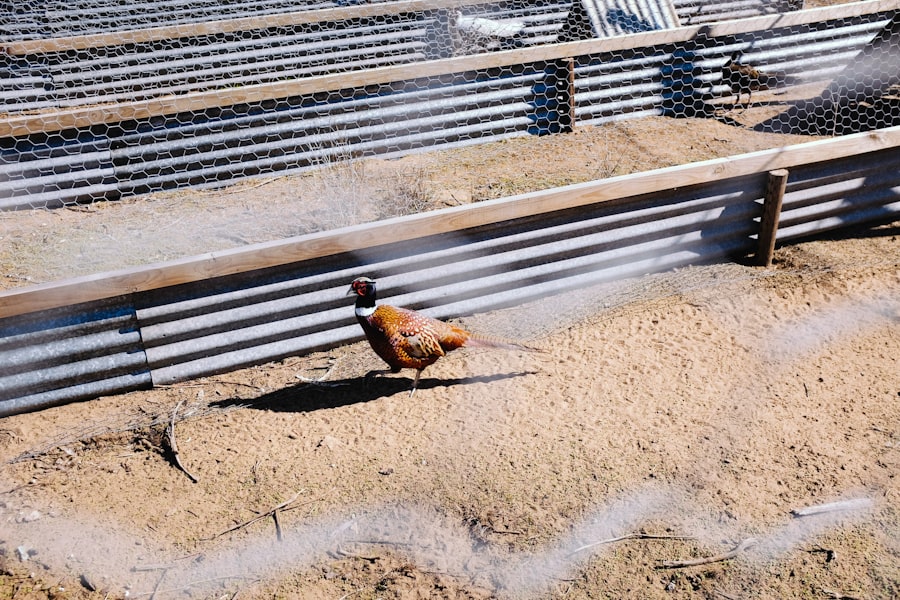Chickens are inherently inquisitive and gregarious animals that actively explore their environment in search of sustenance. Their opportunistic feeding behavior allows them to consume a diverse diet, including plant matter, insects, and occasionally small vertebrates. Comprehending these natural tendencies is essential for effectively managing chicken movements and restricting their access to specific areas.
These birds exhibit a propensity for habitual behavior, frequently revisiting locations where they have previously discovered food or shelter. Once a routine is established, chickens are likely to persist in their visitation patterns unless environmental factors change. Furthermore, chickens display strong territorial instincts, defending their perceived domain against potential threats, including other animals and humans.
This territorial behavior can complicate efforts to exclude chickens from certain areas without implementing appropriate deterrent strategies. Understanding these behavioral traits is crucial for developing effective methods to control chicken movements and protect designated spaces from their presence. By considering their natural inclinations and tendencies, more successful management techniques can be devised and implemented.
Table of Contents
- 1 Creating physical barriers to keep chickens out
- 2 Using natural repellents to deter chickens
- 3 Implementing scare tactics to scare chickens away
- 4 Keeping a clean and tidy yard to discourage chickens
- 5 Providing an alternative area for chickens to roam
- 6 Seeking professional help to deal with persistent chicken problems
- 7 FAQs
- 7.1 What are some natural ways to keep chickens away from your yard?
- 7.2 Are there any commercial products available to keep chickens away from your yard?
- 7.3 Is it legal to keep chickens away from your yard?
- 7.4 What are the potential risks of having chickens in your yard?
- 7.5 How can I protect my yard from chickens without harming them?
Key Takeaways
- Chickens are naturally curious and will explore their surroundings, so understanding their behavior is key to keeping them out of unwanted areas.
- Physical barriers such as fences, netting, and chicken wire can effectively keep chickens out of specific areas of the yard.
- Natural repellents like citrus peels, garlic, and hot pepper can be used to deter chickens from entering certain areas.
- Scare tactics such as motion-activated sprinklers, noise makers, and predator decoys can be effective in scaring chickens away from unwanted areas.
- Keeping the yard clean and free of food scraps and debris can discourage chickens from lingering in the area.
- Providing an alternative area for chickens to roam, such as a designated chicken coop or fenced-off section of the yard, can help keep them away from unwanted areas.
- If persistent chicken problems persist, seeking professional help from a pest control or animal control expert may be necessary to effectively deal with the issue.
Creating physical barriers to keep chickens out
Physical Barriers: A Simple yet Effective Solution
One of the most effective ways to keep chickens out of specific areas is by creating physical barriers that prevent them from accessing those spaces. This can include installing fences or netting around gardens, flower beds, or other areas where you do not want chickens to roam. The key is to make sure that the barriers are tall enough and secure enough to prevent the chickens from flying over or squeezing through.
Underground Barriers: An Additional Layer of Protection
Another option is to use chicken wire or hardware cloth to create a barrier that is buried underground. This can help prevent chickens from digging under the barrier to gain access to the protected area.
Combining Physical Barriers with Other Deterrents
Additionally, using motion-activated sprinklers or noise-making devices can also be effective in deterring chickens from entering certain spaces. These physical barriers can be highly effective in keeping chickens out of specific areas, especially when used in combination with other deterrent methods.
Using natural repellents to deter chickens
In addition to physical barriers, natural repellents can also be used to deter chickens from entering specific areas. For example, scattering citrus peels or spraying citrus-based solutions can be effective in keeping chickens away, as they are known to dislike the smell of citrus. Similarly, using strong-smelling herbs such as lavender, mint, or rosemary can also help repel chickens from certain areas.
Another natural repellent that can be effective in deterring chickens is vinegar. By spraying a mixture of vinegar and water around the perimeter of the protected area, you can create a scent barrier that chickens will find unpleasant. Additionally, using predator urine or predator decoys can also be effective in deterring chickens, as they will perceive the presence of predators and avoid the area.
These natural repellents can be a useful addition to physical barriers in keeping chickens out of specific areas.
Implementing scare tactics to scare chickens away
Scare tactics can be an effective way to deter chickens from entering specific areas. This can include using visual deterrents such as reflective surfaces or shiny objects that move in the wind, as chickens are easily startled by sudden movements and bright lights. Additionally, using noise-making devices such as wind chimes or bells can also help scare chickens away from certain areas.
Another effective scare tactic is using motion-activated devices that emit loud noises or flashes of light when triggered by movement. This can startle the chickens and discourage them from entering the protected area. Additionally, using scarecrows or other decoys that resemble predators can also be effective in deterring chickens, as they will perceive the presence of a threat and avoid the area.
By implementing scare tactics, you can effectively discourage chickens from entering specific areas without causing them harm.
Keeping a clean and tidy yard to discourage chickens
Chickens are attracted to areas with abundant food sources and shelter, so keeping your yard clean and tidy can help discourage them from roaming around. This means regularly removing fallen fruits and vegetables, as well as cleaning up spilled birdseed or pet food that may attract chickens. Additionally, keeping garbage cans securely closed and compost bins covered can also help prevent chickens from finding food sources in your yard.
It is also important to keep your yard free of clutter and debris that could provide shelter for chickens. This includes removing piles of brush, woodpiles, and other potential hiding spots where chickens may seek refuge. By keeping your yard clean and tidy, you can make it less appealing for chickens to visit and encourage them to find food and shelter elsewhere.
Providing an alternative area for chickens to roam

Providing an Alternative Space
If you have chickens of your own and are struggling to keep them out of specific areas, providing them with an alternative space to roam can help redirect their attention away from the areas you want to protect. This can include creating a designated chicken run or free-range area where they can forage for food and explore without causing damage to your garden or other protected spaces.
Satisfying Natural Instincts
By providing an alternative area for your chickens to roam, you can help satisfy their natural instincts while also keeping them away from areas where they may cause problems.
Combining with Other Methods
This approach can be particularly effective when used in combination with other deterrent methods, such as physical barriers and natural repellents.
Seeking professional help to deal with persistent chicken problems
If you have tried various methods to keep chickens out of specific areas without success, it may be time to seek professional help. A pest control expert or animal behavior specialist can provide valuable insight and advice on how to effectively deter chickens from entering certain spaces. They may also be able to offer additional solutions or techniques that are tailored to your specific situation.
Professional help can also be beneficial if you are dealing with a large number of chickens or persistent chicken problems that require a more comprehensive approach. By consulting with experts in the field, you can gain a better understanding of chicken behavior and learn how to effectively manage and deter them from causing damage in your yard or garden. Ultimately, seeking professional help can provide you with the expertise and support needed to address persistent chicken problems effectively.
If you’re looking for more information on keeping chickens away from your yard, you might be interested in this article on how to build a chicken coop in Grand Island, NE. This article provides valuable tips on creating a safe and secure space for your chickens, which can help prevent them from wandering into your yard.
FAQs
What are some natural ways to keep chickens away from your yard?
Some natural ways to keep chickens away from your yard include using strong-smelling herbs and plants, such as lavender or mint, creating physical barriers like fences or netting, and using motion-activated sprinklers to deter them.
Are there any commercial products available to keep chickens away from your yard?
Yes, there are commercial products available, such as chicken repellent sprays and ultrasonic animal repellent devices, that can help keep chickens away from your yard.
Is it legal to keep chickens away from your yard?
It is legal to keep chickens away from your yard as long as you are not harming the chickens or violating any local ordinances or regulations regarding animal control.
What are the potential risks of having chickens in your yard?
Some potential risks of having chickens in your yard include damage to landscaping and gardens, spreading of diseases, and attracting predators such as foxes or raccoons.
How can I protect my yard from chickens without harming them?
You can protect your yard from chickens without harming them by using natural deterrents, creating physical barriers, and ensuring that your yard is not an attractive environment for chickens to forage.
Meet Walter, the feathered-friend fanatic of Florida! Nestled in the sunshine state, Walter struts through life with his feathered companions, clucking his way to happiness. With a coop that’s fancier than a five-star hotel, he’s the Don Juan of the chicken world. When he’s not teaching his hens to do the cha-cha, you’ll find him in a heated debate with his prized rooster, Sir Clucks-a-Lot. Walter’s poultry passion is no yolk; he’s the sunny-side-up guy you never knew you needed in your flock of friends!







